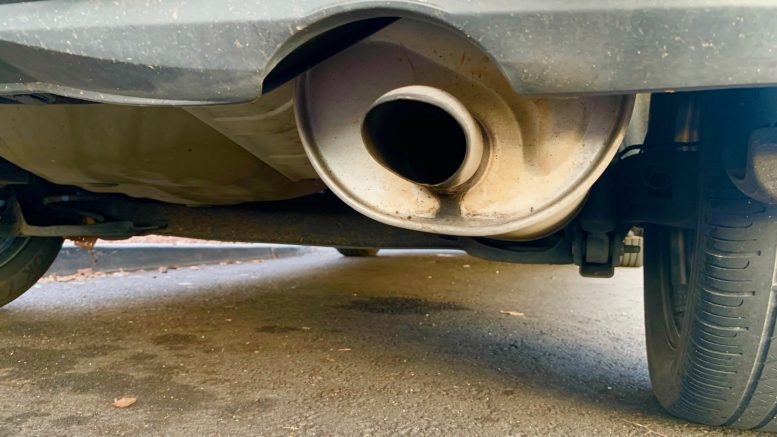By Gavin Hudson and Raymond Purscell
A new law seeks to counter a flood of thefts by etching vehicle id numbers onto catalytic converters, though some police, mechanics and business owners are skeptical that it will work.
In 2018, there were roughly 1,298 stolen catalytic converters nationwide, according to the National Insurance Crime Bureau. In 2022, that number jumped to 64,701, with California accounting for over 24,000 of those thefts – three times as many as the state with the second highest thefts.
California Governor Gavin Newsom recently signed two bills into law aimed at increasing recovery efforts for catalytic converters. SB55, authored by state senators Tom Umberg and Anthony J. Portantino, would require car dealers to mark the vehicle’s identification number onto the catalytic converter unless the person buying the part or vehicle refuses.
The bill further requires that businesses keep a detailed written record of catalytic converters and the vehicle they are assigned. It states that converters can only be bought using traceable forms of payment such as credit, debit or check.
AB1519, authored by Assembly Member Dr. Jasmeet Bains, makes scratching off the identification number from a catalytic converter or knowingly possessing three or more altered converters a misdemeanor crime.
Woodland Police Sergeant Richard Towle said some programs exist to mark converters, but that won’t solve the problem.
“We have a mechanic shop that we’ve partnered with here that we’ve done etching with,” Towle said. “We haven’t had any reports of those specific ones being stolen. I think it’s a multi-layer problem. I mean, it’s a problem that catalytic converters cost that much in the first place. That’s really what’s making them attractive for these people to steal.”
Police rarely recover stolen converters. Towle doesn’t see that changing as much as the bill’s authors may hope.
“My understanding is that a lot of these are being shipped out of state,” the sergeant noted. “And once it leaves the state, these laws aren’t going to help.”
Towle added that thieves typically sell the parts to recycling plants that harvest the precious metals that make the converters so expensive. He believes that will continue to be the case.
“I don’t know that it’s going help or hurt us in that regard, because I know a lot of that is happening already,” he observed.
Additionally, Towle sees the punishment as negligible compared to the money that can be made from the theft.
“It seems to me that the penalties are pretty low,” he offered. “Catalytic converters are like $2,000 to $5,000… and you have a $1,000 penalty, the person stealing is at less risk than the person having to rebuy it when it’s stolen.”
Woodland Resident Ryan Burger had his catalytic converter stolen in late 2022 and recalled that neither the police nor his insurance were very helpful.
“It was kind of a pain in the ass dealing with the police because if it’s damages of less than like $5,000, they can’t really do anything about it, ” Burger explained. “The insurance that I had didn’t cover theft or destruction, it’s only if I got into an accident.”
Burger ended up paying around $2,500 to replace the part.
While the idea of being able to track the part afterwards sounds nice, Burger doubts the reality of it, adding, “I don’t think my situation would have gone any different… The only real benefit that would have is that if someone steals it, they can get it back to you. I feel like if someone is going to steal it, they are going to steal it and just scratch the number off.”
Colby Sandman is the owner of Muffler Tech in Sacramento and has been in the business for thirty years. His business installs catalytic converters often. Sandman worries that these bills will be used to make his shop engrave VIN numbers onto converters. He believes these laws, and laws like them, are restricting his ability to do business since there is a chance that he would not be able to charge for an engraving process that comes with burden and risk.
“It is increasingly harder and harder to operate a business in this state,” Sandman reflected. “We’re already at a point where we don’t want to employ anybody new because of all the restrictions and regulations.”
According to Sandman, the risks involved in the engraving process include the possibility of voiding the manufacturer’s warranty and/or damaging the converter during the engraving process. Certain circumstances could leave the installer responsible for the part or an incident involving the part.
Muffler Tech has previously put VIN numbers on certain customer’s catalytic converters for a fee, if the customer requested it.
“We have a lot of our own data to pull from, the amount of cats that were stolen did not change whether we engraved something on them or not,” Sandman said.
Hai Toung, a mechanic at Smog Express, a smog shop on Folsom Boulevard, does not believe the engraving process would be too cumbersome, but he also does not believe the law will have a significant impact on reducing theft.
“We would just get an engraver and put the VIN number on the cat but engraving is nothing – they just grind it out,” Toung said.
In some cases, a thief would not even have to grind out the VIN number. Catalytic converter thieves are often taking their stolen converters across state lines or even to other countries where a California VIN number would not necessarily impede a sale to a catalytic converter recycler. In addition, certain recyclers are melting the converters down in order to obtain the precious metal inside called rhodium.
“This isn’t a state problem, this is a global problem,” Sandman pointed out, “so why make it harder on the consumer and the small business person like myself?”


Be the first to comment on "Leaders grapple with the fact that catalytic converter thefts are soaring"